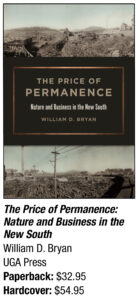 In The Price of Permanence: Nature and Business in the New South, William D. Bryan, an environmental historian in Atlanta, uses the lens of environmental history to provide a reinterpretation of the post-Civil War South. Bryan frames the New South as a struggle over environmental stewardship.
In The Price of Permanence: Nature and Business in the New South, William D. Bryan, an environmental historian in Atlanta, uses the lens of environmental history to provide a reinterpretation of the post-Civil War South. Bryan frames the New South as a struggle over environmental stewardship.
For more than six decades, academics have caricatured Southerners as desperate enough for economic growth that they hungrily devoured the South’s abundant natural resources. However, business leaders and public officials didn’t view profit and environmental quality as mutually exclusive goals, and they encouraged conservation methods they thought would promote long-term economic growth. Southerners called this idea “permanence.” Even so, it was a contested concept, and businesspeople and stakeholders clashed as they struggled to discover new ways of using resources. In The Price of Permanence, readers will gain insight as to how these struggles permanently shaped the modern South.
Bryan writes the South into the national conservation movement for the first time and shines a light on the key role business leaders played in shaping the ideals of American conservationists. His book also disassembles one of the misrepresentations of Southerners: they had little interest in environmental quality. The thought of “permanence” safeguarded some resources but didn’t stop the degradation of the environment overall, and The Price of Permanence ultimately uses lessons from the New South to reflect on current-day sustainability.







